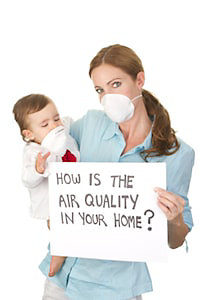3-Step Action Plan to Cleaner & Healthier Air in Your Home

February 26, 2014
Your home’s air could be 100 times worse than the worst outdoor air.
This according to the Environmental Protection Agency (EPA). In studies, they found that the average home has 2-5 times the air pollutants as outdoor air. And many had up to 100 times more contaminants than the worst outdoor air.
And many times, these pollutants are even worse than those found outside.
Luckily, reducing your exposure to these harmful air contaminants isn’t extremely difficult. It just takes some action on your part. Here’s a quick, 3-step plan to cleaner indoor air.
Step 1: Identify and remove the source of contaminants
The best way to improve the indoor air quality of your home’s air is to simply remove the source of the pollution. Seems easy enough, right? It might actually be more difficult than you think, as so many items in your home can contribute to poor indoor air quality.
However, there are a few things you can easily remove from your home that will improve your home’s air quality.
- Smoking. Don’t do it inside. The health hazards of second-hand smoke are well documented.
- Humidity. Your home’s humidity should be kept under 50% year-round. Humidity serves as a breeding ground for mold, mildew, and other bacteria. A whole-home dehumidifier can help.
- Candles & air fresheners. Candles and air fresheners don’t clean your air, they simply mask it with more chemicals. And many of the chemicals are very unhealthy.
- Cleaning products. Many cleaning products release chemicals into your air, even when just being stored. Use safer alternatives and store them outside rather than in your home.
- Water leaks. Make sure you promptly repair any water leaks in your home as standing water can encourage growth of mold and bacteria.
- Fire. Combustion naturally releases smoke and other contaminants into your home’s air. So avoid wood-burning stoves or fireplaces.
Step 2: Increase your home’s ventilation
According to the EPA, the best cure for a polluted home is ventilation.
And that means a few things. First, it means you should open up your windows more often in general. As we said, most homes are much more polluted than outdoor air, so letting in fresh air is key to a healthier home.
But there are also specific times you should ventilate your home that are equally important. Here are a few:
- Taking a shower – Always run your bathroom exhaust fan. This helps get rid of the excess humidity (which can serve as a breeding ground for bacteria and other contaminants, as we’ve already discussed.)
- Cleaning your bathroom – Many cleaning chemicals release more chemicals into your home’s air when used. Make sure your vent fan is on and open windows in the area.
- Painting – All paints release some chemicals when applied and drying, so make sure to open up your windows and ventilate for a few days.
- Cooking – Any time you use your stove, you should be using your kitchen exhaust fan (if it’s vented to the outside). This removes many common indoor air pollutants from your home.
- Installing new flooring/furniture – If you’ve ever got new furniture or carpet in your home, you’ve probably noticed a smell afterward. This can be a result of hazardous pollutants like formaldehyde.
Step 3: Consider your air-cleaning options
Even if you do all of the above, your home can still contain unhealthy levels of indoor air pollution. That’s because we just can’t live without many of the things that give off or create indoor air pollution (cooking, showering, cabinets, cleaning, etc.)
So, you have some air-cleaning options. Here are some of the most popular.
- Air-cleaning plants – As we discussed last month, you can use some plants to naturally clean your home’s air. (Although it can take a lot of plants to clean a whole home.)
- Duct cleaning – A lot of the junk in your air settles in your home’s air ducts. Duct cleaning gets rid of those contaminants, so they aren’t blown back into your air.
- Dehumidifier – Keeping your home’s humidity at the right level helps reduce indoor air quality problems. It also makes your home more comfortable and can save you money.
- HEPA air filters – High-efficiency filters remove even the smallest of indoor air pollutants. These products are similar to what hospitals use to keep their air clean.
Air quality help from the experts
And if you want help cleaning your home’s air, give Cool Today a call. We’re the air quality experts in Florida.
Posted in: Tips